|
“Gorakh Hill Station” was one of those phrases I had heard many times from my Sindhi friends, a place of myth and legend, or so it seemed. But what it actually was, I had no idea--until recently. So when the opportunity arose for me to go and discover this fabled place, I quickly agreed, even though it would involve a long drive requiring a rugged vehicle and an overnight stay in some mysterious and rustic lodging. “We will pack blankets and towels and these lights,” said Papa Saeed distractedly as he switched some portable lights on and off to check their charge. “Because you know there might not be electricity on the Gorakh Hill. And bring a… you know, this thing. Shawl. Right? ...Because it will be cold.” So I packed a change of clothes, including a sweater and a shawl, but somehow when you are in the pattern of one kind of weather it is very difficult to imagine what you will need in a different one. Temperatures in Larkana had been hovering around a balmy 90 degrees (32 C) in the daytime, and my body had already forgotten the sensation of cold wind slapping against it. Papa Saeed had made all the necessary arrangements, as usual, without my fully knowing what they were. But it is a sign of the deep trust I have in him as a father-figure that I had no qualms about taking on this rather arduous journey to a remote place in his company, along with only a few other (male) friends and helpers. Our adventure crew--as I began to think of them--consisted of Javed Shaikh, an engineer, who also provided the vehicle required to tackle this terrain; Akhtar Lund, a friend who had stayed at Gorakh many times before and knew the route well; Barkat, a servant of Akhtar’s; Hajji Mehmoud, the Larkana policeman who was my guard during my whole stay; and another driver, whose name I unfortunately do not know. For the first part of the ride--the easy part--our adventure team took two vehicles. The professional driver was at the wheel of the Hilux SUV that Javed had provided, and Javed in the front seat; papa and I in back. Akhtar Lund followed us with his servant and my guard in a separate car as far as Johi, which is essentially the last outpost of civilization on the way to Gorakh. In Johi, the other car was parked and left behind. Javed now took the wheel of the SUV, and Akhtar sat in the front. The other three men -- guard, servant, and driver, now all sat in the open bed at the back of the car, exposed to all elements--sun and dust and wind and the sweeping heights of the mountains as we continued. But after consolidating our crew in Johi, there was quite a lot of road to traverse before we actually came to the mountains. This land is generally a flat, desert plain--perhaps not a genuine desert, and I have not yet experienced the true deserts of Pakistan so I cannot compare, but certainly to my Western eyes this seemed to be something approaching a desert. There is vegetation, but these were mainly the hardy, sharp-edged shrubs and knotted trees that can grow in desert wilderness. Papa and Javed were discussing the possibilities of vegetation in this region, talking about the water table and the potential irrigation systems and, I think, one irrigation line that had been brought in at some point in the past. I listened with half an ear while we bounced and rumbled our way over the road of dirt and rock, the edges of which had been eroded dramatically by flood waters during past monsoon seasons. Javed handled this road deftly, though I learned that this was actually his first time driving it. In his professional life, he has worked to improve and restore infrastructure and heritage sites much like this one, and his hope is to play a role in improving accessibility to Gorakh as well. Because of the difficulty of the journey, it is a place that many Sindhis only dream of seeing. 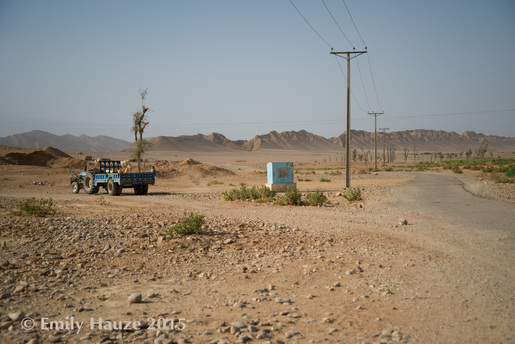 But that does not mean that the road was empty. All along the drive I was quite amazed to see how many other vehicles were proceeding along the same terrain, some of them far less adaptable to the wilds. Especially early on in the journey, we passed several painted freight trucks, piled high with cargo and human passengers as well, precariously tilting left and right as they approached us on the narrow road. Others were regular cars, some donkey carts, some camel caravans, some tractors, some motorcycles. Only one vehicle could fit comfortably on the road at any given point, so the other would always have to come to a complete stop to allow it to pass. Javed was authoritative in his driving and almost always required the other vehicle to do that stopping and waiting while we barreled past. At no point did the road empty completely of other travelers, but it became far less populated as we approached the mountains. I asked Papa if we could occasionally stop for photographs, as my camera was beginning to feel eager to soak in the new surroundings. He said of course and that I could stop them at any point. And each time we stopped, when I emerged from the car, I found us amidst a landscape that was brighter, dustier, emptier, and windier than it had previously been. Always seeking a higher vantage point, I would climb up onto the back of the car, where the three fellows had been riding so dauntlessly. And as I snapped photos of the wilderness from this perch, with my guard and his rifle sitting very close by, and my bright red dupatta flapping in the wind, I thought of what a strange adventure my life had become since I had discovered and been discovered by Sindh. But I tried not to linger in this reverie, as there were still more miles to be traveled, and although every vista was worthy of being photographed, we couldn’t stop everywhere, especially because we intended to arrive at the summit by sunset. Soon we were climbing steep roads, twisting our way up the mountain. Out the right car windows we could see how high we were swiftly rising, where the road dropped off sharply into an increasing abyss. 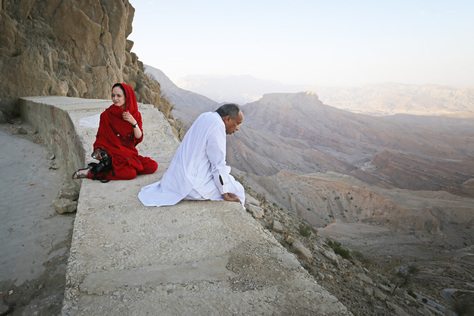 Munhnjo papa ddadho ddingo aahey. Munhnjo papa ddadho ddingo aahey. We stopped the car for photos at one starkly beautiful hairpin turn in the road. Here, unlike many other places, there was a stone guiderail protecting us from the cliff-edge. But my dare-devil Papa insisted on removing that layer of protection and dangling his legs over the edge. “I will not fall for thirty years!” he proclaimed--referring to some fortune-teller’s recent prediction. I do not find this line reassuring. However, my pleas to Papa to play it safe always fall upon deaf ears. My own stubbornness is well known to all my friends…. but there is one person I know who is even more immovable, and that is papa. So I have many photographs of a grinning papa balancing on some rock-face or other, which I snapped through clenched teeth and then demanded he return to safety. Which he always did, with his charming but naughty giggle. The sun’s rays were slanting toward horizontal and the wind was picking up as we covered the last stretch of road, finally arriving at Benazir Viewpoint just a few minutes before sunset. I had to spend a couple of those minutes opening my suitcase and pulling out that shawl I had brought along, because the wind was fiercely cold. Wrapped as best I could manage, I trotted out to where Papa and the others were already admiring the expansive vista in its last sunlight of the day. 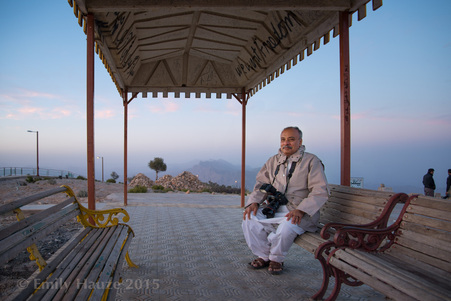 Papa, impervious to cold. Papa, impervious to cold. Benazir Viewpoint feels a surprising outpost of civilization and organization after one has traveled on the ruined and abandoned road that leads there. The Viewpoint itself is a well-planned tourist destination, signpost and all. A stretch of concrete sidewalks, fitted with hand railings all along, makes for a safe and scenic walk along the summit of Gorakh Hill. At both ends of the sidewalk track there are pavilions with scrolled park benches--and these would have been delightful places to stop and rest, had the wind not been so brutal. (I can certainly understand why this place is a beloved haven for Sindhis in summertime, when temperatures at ground level range from ultra-hot to sweltering.) I don’t know how many miles one can see into the distance from up there, but it seemed limitless. What makes it uncanny, however, is that there is no evidence of human civilization in all those miles of landscape. That view is almost entirely a symphony of stone, softened only a little by those hardy short shrubs and, further out, narrow and winding beds of waterways, dry at this time of year. The starkness of it all makes the visitor wonder if he has accidentally landed on Mars, especially when seen in the reddening light of sunset. 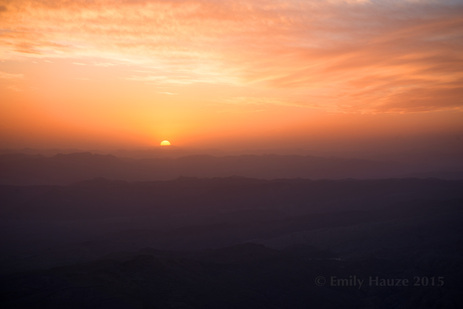 I could only tolerate a small amount of this cold, so after the sun had descended completely, I urged us back into the car to make our way over to the guest house. If the sidewalks and signposts seemed improbable up here at this height, the guest house on Gorakh seemed even more unlikely. There are two buildings, actually, though they are not connected by anything as logical as a road, or even a walkway. From the guest house proper, one can look across a stretch of rocky and uneven terrain toward the other building, which is more of a conference center. Both are elegant, simple constructions, with airy archways and views over the bluff. Getting from one to the other, the car has to do some rough four-wheel maneuvering; walking across the rocks to get there is relatively easy in comparison. For the time being, we only needed the guest house. We got the vehicle somewhat close to the building and then carried our suitcases the rest of the way. (Actually, Hajji Mehmoud carried mine. In all my time in Pakistan, I don’t think I ever had to carry my own suitcase -- it was always the work of a servant or guard -- and this never ceased to feel like a real luxury to me.) 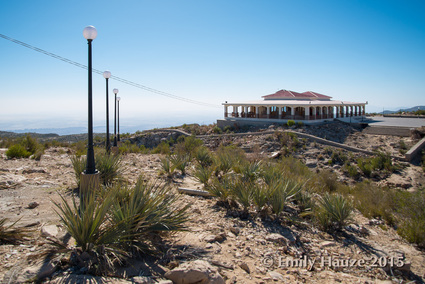 View from the guest house building to the other, rec-center type building. View from the guest house building to the other, rec-center type building. The night was quickly darkening, but at this point there was still some electricity functioning inside the guest house -- though only in specific rooms, we learned. The lodge is built in a hexagonal shape (or some similar polygon), with numbered guest rooms whose doors open up onto a central courtyard which is open to the sky. There was some confusion as we tried to figure out which rooms to occupy. We were the only guests staying there that night, fortunately, but the configuration still caused us trouble. Papa was looking for a room with two beds, so that he could stay in the same room with me. But the only rooms with twin beds were ones (if I remember correctly) that had no electricity. So he was trying to work out a way to have a second bed brought into one of the regular rooms. But soon I realized that he was going to this trouble purely out of worry that I would be frightened if left alone in a room here. Fears of that sort, usually from pure superstition, are common among girls especially in Sindh -- my sisters had even offered to stay in my room back at the Sangi house in case I was scared to be alone in that space. Here same as there, I assured Papa that I had no qualms about being in a room by myself, and that actually I’d be more comfortable that way. The doors had good bolts on them, so I didn’t feel vulnerable. He seemed satisfied, and the order for a second bed delivery was called off. I took a few minutes to organize my things in my room and to put on as many additional layers of clothing as I had with me. Inside the rooms was only marginally warmer than outside, partially protected as they were from the harshness of the wind, but not from the ambient cold. Rejoining Papa and the other gentlemen, I sat huddled on a chair as far away from the open door as I could. The guest rooms are all elegantly appointed, at least at first glance, with fine chairs and large beds and tasteful furniture. This must be the room in which Akhtar will be staying, I thought, seeing his servant pull out a variety of homey comforts from the suitcases they had brought: fresh bedsheets and pillows and blankets to replace the rather dubious ones that were there. (“Dont worry sweetie,” said Papa to me, “we can use the clean towels that we brought as bedsheets and pillowcases.”) My eyes must have brightened significantly when I saw teacups and a kettle emerging from Akhtar’s luggage, however. It is a particularly delightful talent of my Pakistani friends to be able to conjure hot tea and coffee practically from thin air. And Akhtar had not only this but also a soft and spongy pound cake from a Larkana bakery. Hot coffee and buttery sweet cake were exactly what I needed to improve my spirits, which had soured in response to cold temperatures and low blood-sugar. Soon I was once again content. And then very soon after that it was already dinner time. The dinner materialized even more miraculously than the tea had. I don’t know where it had been prepared -- presumably in the other building, across that rocky expanse, because I hadn’t seen a kitchen in the guest house. But soon there were staff members--all cloaked heavily against the cold--bringing in dish after covered dish of hot and flavorful Sindhi foods. The dishes kept arriving--more than we had room for on the makeshift table that we improvised by pushing several small chests of drawers together. It was an enormous spread of food which could have easily fed twenty people, though we were only seven. Papa, Javed, Akhtar, and I were served first, but we had several of the dishes sent over to our guard and servants, who were eating in a different room. That sort of upstairs/downstairs division is deeply ingrained in the society; it is simply understood, for reasons I still don’t completely grasp. As the staff servants were leaving the room, having dropped off the dishes, Papa asked if I wanted a cold drink (and the phrase “cold-drink” is generally used in Sindh as if it were one word, meaning “soda”), and I said I’d love a Diet Coke. The servants had already left the room, so Akhtar turned his head toward the door and bellowed, “Chhokra!!” (“Boy!”) I smiled to myself, since such forceful commands still strike my American sensibilities as something both comical and uncomfortable. But I certainly couldn’t complain; and my cold-drink was delivered to me in moments. Midway through dinner, the room went black. Loss of electricity is something that all Pakistanis are familiar with, and sudden darkness is usually greeted with a mixture of giggles and groans. Blackouts on Gorakh Hill are noteworthy, however, because it gets extremely dark up there. No nearby buildings with auxiliary power bleeding a pale glow into your frame of vision--because there are no nearby buildings. On Gorakh, there’s only starlight. Just as one becomes accustomed to sudden darkness in Pakistan, one also grows to expect the inevitable first point of light that will pierce that darkness, namely the tiny beam of whichever cell-phone flashlight is easiest at hand. And that little light tends to illuminate the way to a larger, battery-powered LED light, whose wan, bluish color will have to suffice for the time to come. Usually, planned load-shedding only lasts a span of an hour or two, at least in the larger cities I have visited, and other outages are generally shorter. On Gorakh Hill, however, we would not have electricity for the rest of the night or the following morning. There was also no cell signal, so for these next hours we were truly disconnected from the grid of modernity. Warmed from our dinner, Papa and I ventured into the windy courtyard to look up to the stars, undimmed by light pollution. Taking photographs of these stars, without the help of a tripod, proved difficult. Papa brought out one of our blankets, which I wrapped around myself like a cocoon, and lay smack in the middle of the courtyard facing upwards, trying to hold my camera still for an 8-second exposure, which feels like an eternity when trying not to shiver in the cold. The results were not stunning -- I didn’t manage perfect stillness for any of the takes -- but the stars and other heavenly bodies were still recorded, with their colors, in my camera. “Emily, what on earth are you doing!” called Javed, who had caught sight of me in my strange brown bundle at the center of the courtyard. I laughed. Photography often requires strange pantomimes. And I would have stayed at it much longer, were it not for the cold. So I gathered myself up and went back in to join the others, now gathered in yet a different room (Papa’s, I think), where I deposited myself, still wrapped in the same blanket. The four of us sat in discreet blanket-wrapped packages, lit by two of those intrepid but struggling battery-powered lights. Javed had told me that he is an avid singer, so I took this opportunity to ask him to teach me a Sindhi song. Fortunately, the one he chose was simple enough for me to catch on: “Shaam jo hee pahar, naan asaan jey kayo… kujh ta eenda kayo, key ta gaalhyon kayo.” I asked Javed to sing each line several times, while I repeated them to him. Papa meanwhile offered translations: “In the evening, dedicate some time to me -- come by sometimes, let us talk a while….” With a great deal of help and repetition, I was able to repeat the whole first verse and commit it to memory, and sing it again the next morning and later on in my trip, for other Sindhi friends. So this first Sindhi song was an immaterial but valuable gift that I was given on Gorakh Hill. But when we were done singing, Papa promptly announced that it was bedtime. So we adventurers dispersed into our different rooms, each with our handheld lights guiding us to our beds. I bolted my door closed and attempted to jam it shut in such a way that it would not rattle quite so fiercely in the wind, but this was not possible. The creaking and rattling of doors and windows has to be accepted as part of the rustic charm of the Gorakh guest house. In those last minutes before sleep, I was scribbling ideas down in my notebook for this very blog entry. And now I think it is the appropriate moment to end this episode, although the adventure continued in the morning, when we were able to see the same sights as the previous evening, now in the clear light of day. But I will let the photographs in the slide show below fill in the end of the story, and bid you, dear reader, Allah wahee (God bless) until I post my next entry. Gorakh: slide show
22 Comments
|
Image at top left is a digital
portrait by Pakistani artist Imran Zaib, based on one of my own photographic self-portraits in Thari dress. AuthorCurious mind. Archives
September 2020
Categories |
emily s. hauze
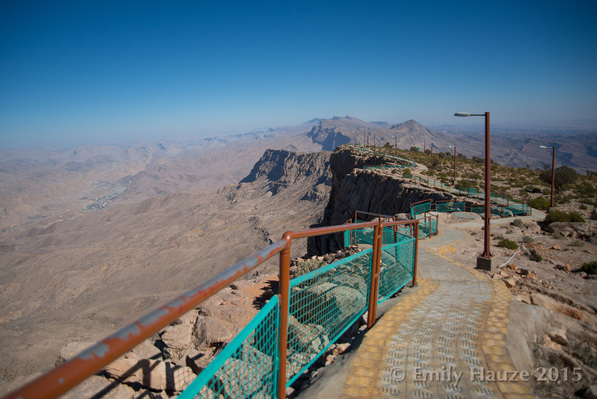
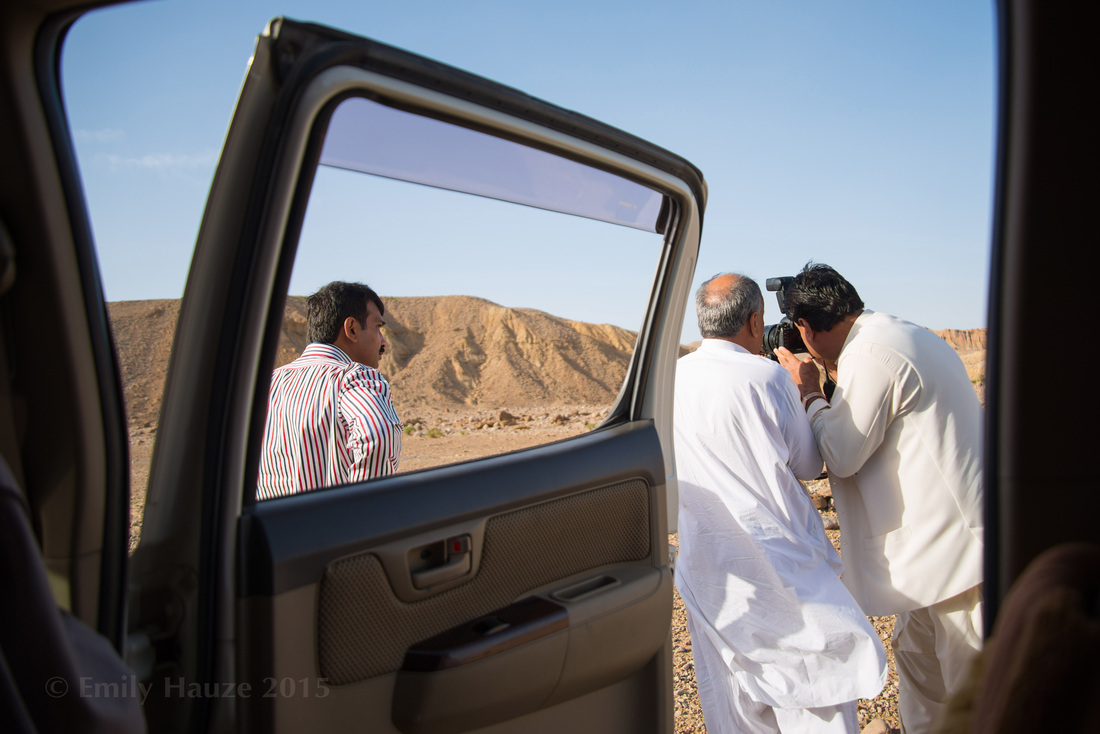
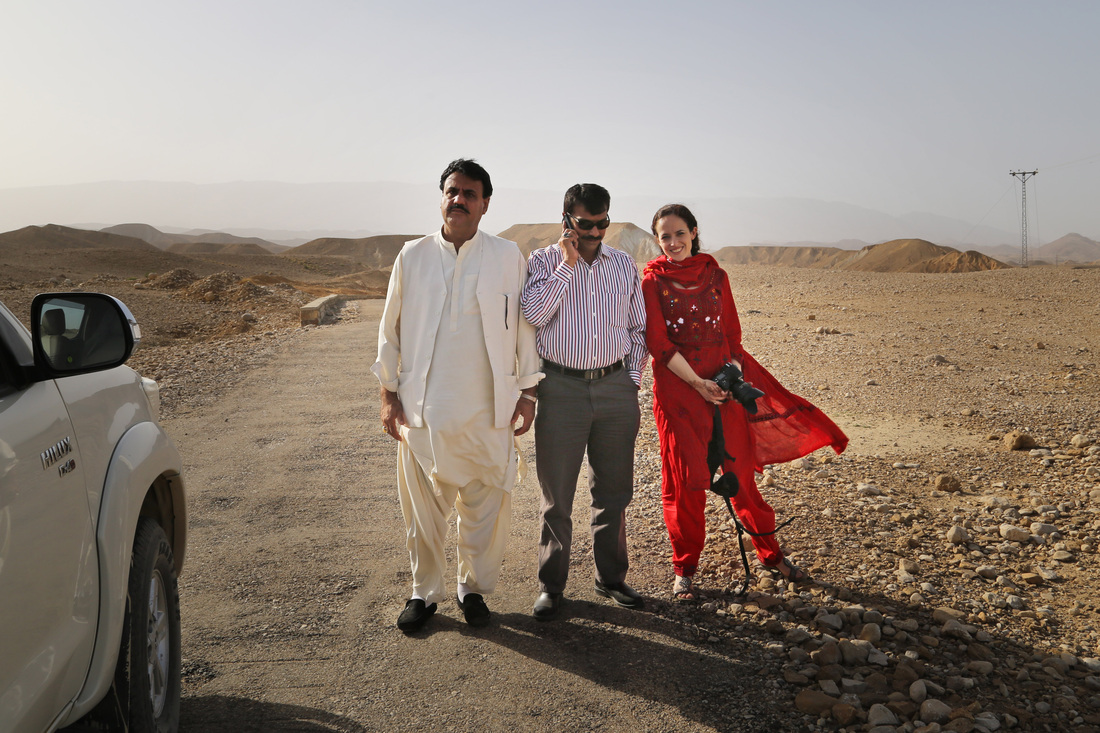
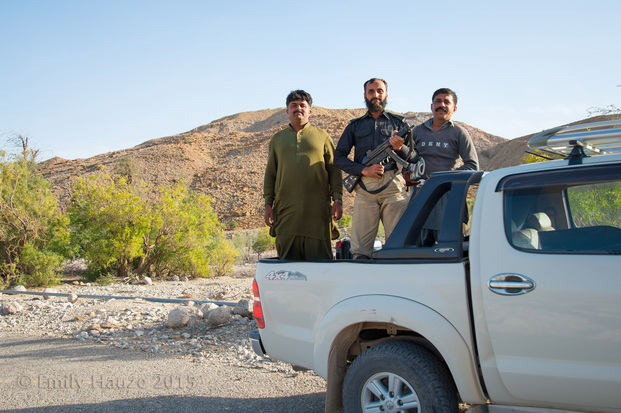
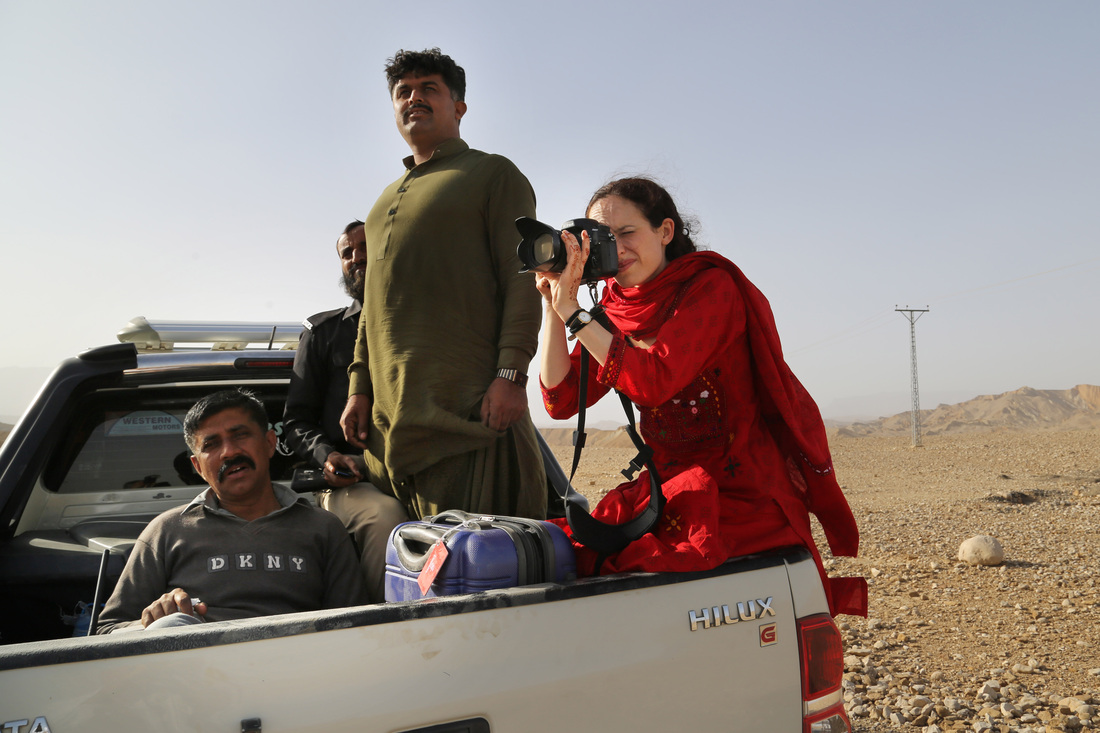
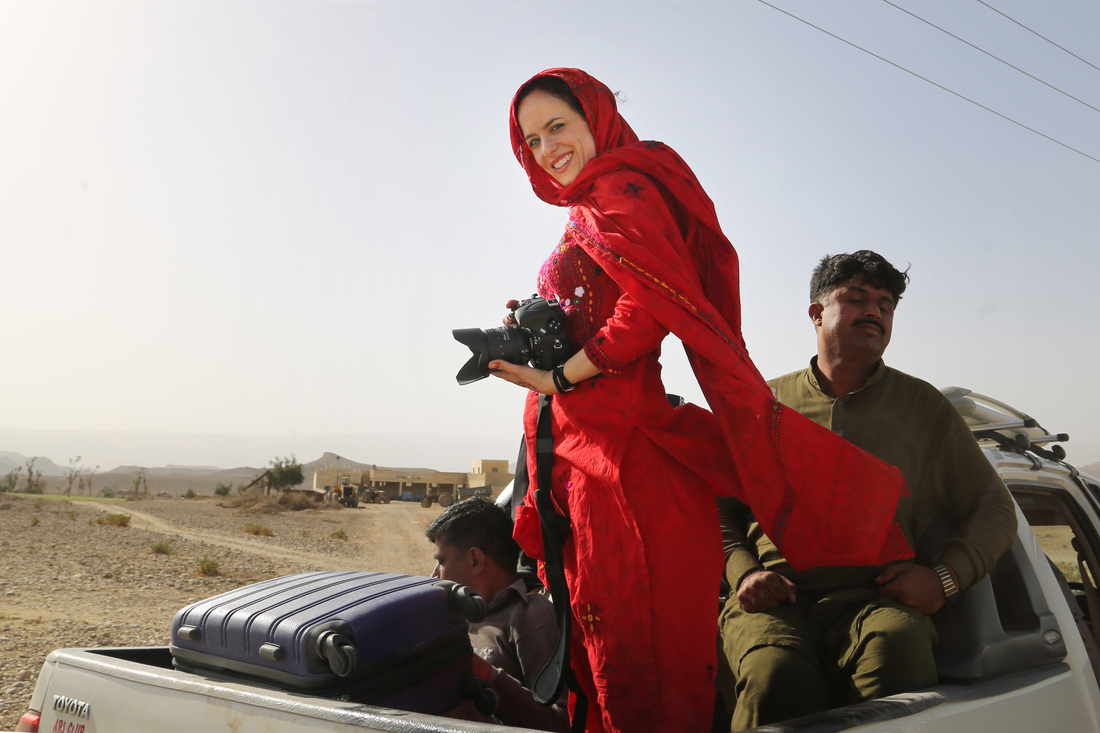
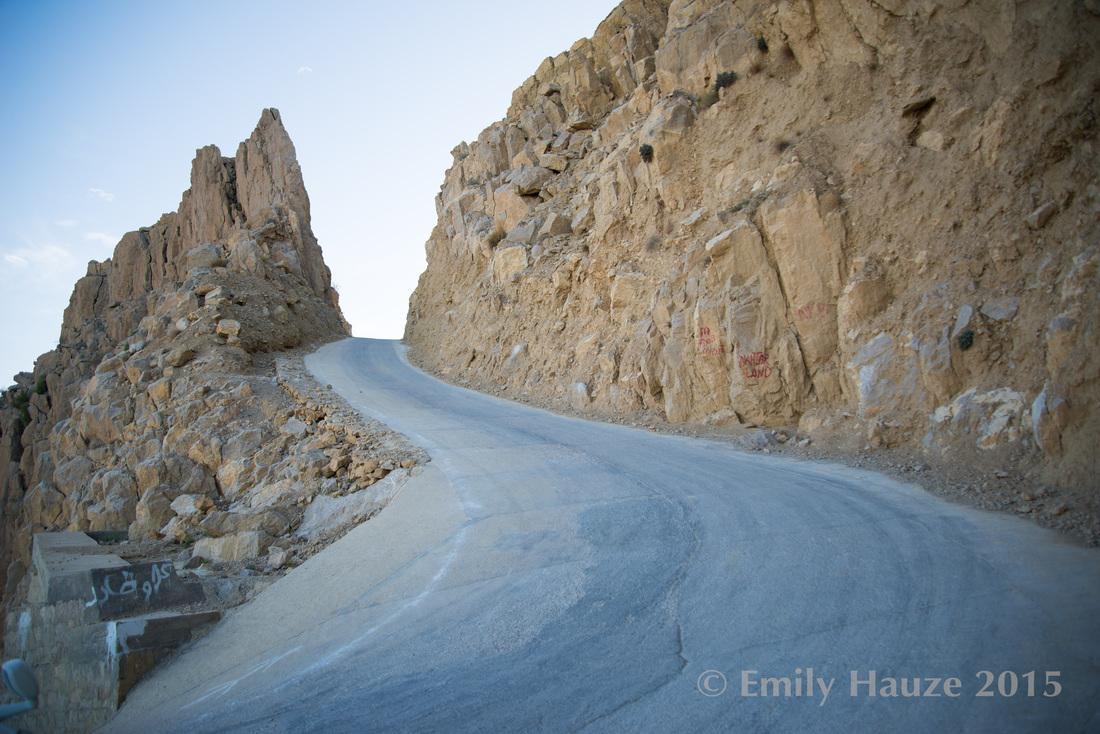
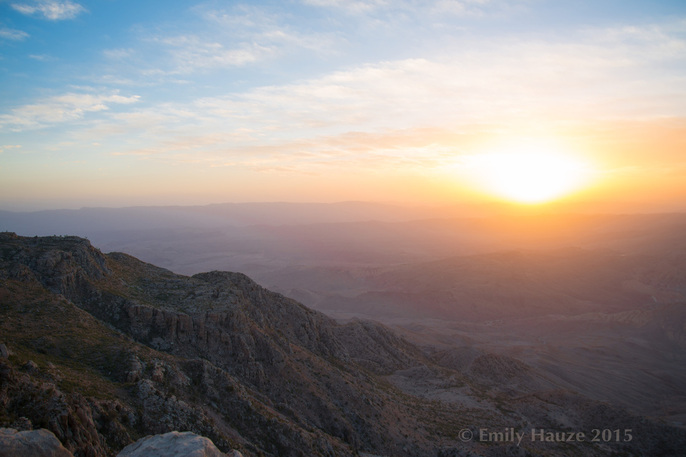
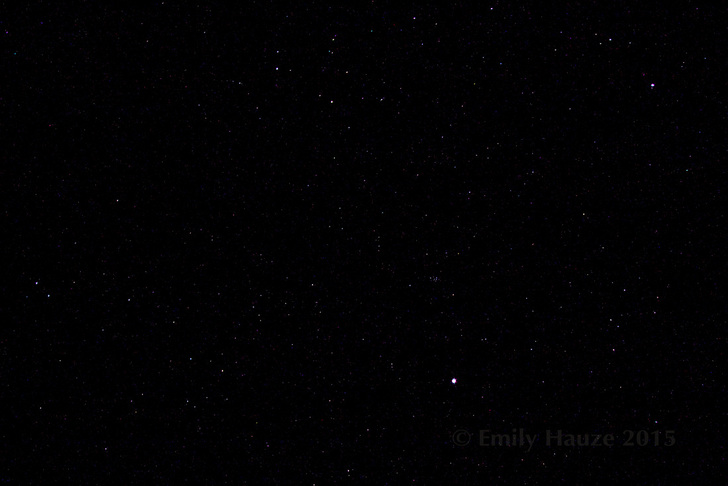
 RSS Feed
RSS Feed
